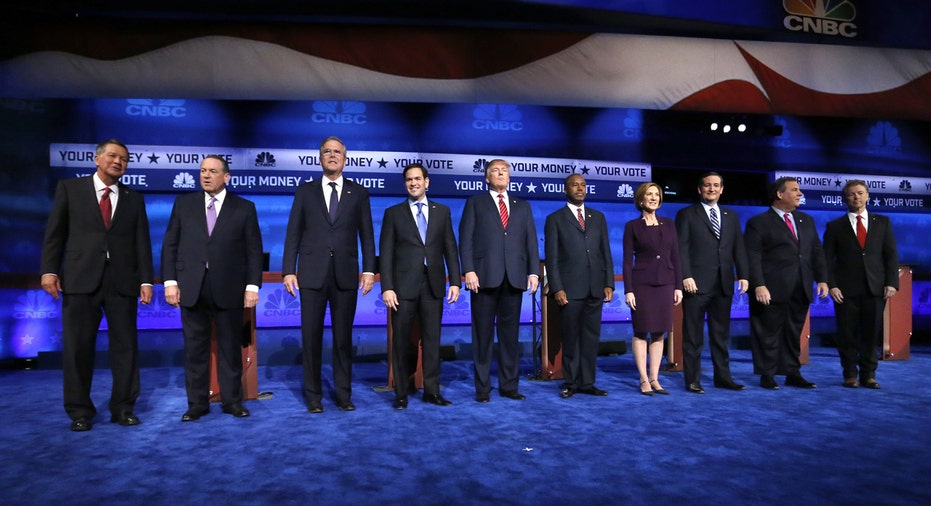Leadership Lessons From the Botched GOP Debate

Did CNBC botch last week’s GOP presidential debate? Absofreakinlutely. Worse than any presidential debate I’ve ever seen. It was a real train wreck.
As soon as I heard the opening question, “What is your biggest weakness and what are you doing to address it?” I knew we were in for a long night. Honestly, does it get any more amateurish than that? And yet, that was the only point in the evening when the moderators actually had control of the debate.
In a desperate ploy for ratings, the network that claims to be “First in business” proved to be more adept at throwing raw meat to the controversy-hungry masses instead of simply doing its job and focusing on the economy, as it was supposed to do.
I couldn’t have been more surprised. With so much low-hanging fruit that’s right up their alley to pick from – boosting the sluggish economy, the national debt, creating jobs, fixing the broken tax system, the Fed’s cheap money policy – the moderators instead opted to pit the candidates against one another like they were in a street fight.
But they weren’t the only ones that screwed up. While a few candidates shined, many followed CNBC down the rat hole. It was embarrassing to watch, but then, as with all failures, there were lessons to be learned. Lessons you would think highly accomplished CEOs, governors and network executives would know by now, but apparently don’t.
Stick to your competency.
The debate almost immediately got out of hand because the moderators were in over their heads and ended up getting their heads handed to them by the candidates. Had they stuck to their competency – business and the economy – that never would have happened.
The same goes for the candidates. Former governor Jeb Bush appeared out of his element going after senator Marco Rubio. He sounded weak and petulant and it gave Rubio a chance to shine. That’s a lesson every aspiring executive learns on his way up the corporate ladder: Always play to your strengths … especially in public.
Don’t take the bait.
If you’ve spent any time in a boardroom you know that leadership is a full contact sport. It’s not for the faint of heart. I can’t tell you how many times I was attacked or baited over the years, but if you hope to survive and thrive over the long haul, you quickly learn that you’re far better off not taking the bait.
Don’t get me wrong; when it’s about real issues and done constructively, conflict is critical to effective decision making. But when it’s personal, it does only harm, as it did when Bush and Donald Trump foolishly went after Rubio and Governor John Kasich.
Always be prepared.
Successful business leaders know that the secret to making their own luck is being prepared so they can capitalize on opportunities when they arise. Rubio and senator Ted Cruz are masters of that and it shows, which is why they’re rising in the polls.
Meanwhile, when Dr. Ben Carson is asked to explain his position on Medicare and tax policy, he always sounds a little befuddled and definitely not in command of the numbers. That’s a big mistake, especially this late in the game.
Never lose your cool.
Clearly frustrated that the process has not gone their way, Kasich and Bush both seemed rattled and angry – not a great way to come across when you’re vying for the highest office in the land. There’s a time and a place for self-righteous anger, and for leaders, that’s called when no one’s around but close friends and allies.
Don’t try to be what you’re not.
The most important lesson hands down is to always be the genuine you. Trying to be something you’re not always ends badly. It didn’t work for CNBC, the moderators, or the candidates that took the bait. It hurt all their respective brands, and it left big openings for “drop the mic” zingers like this one from Governor Chris Christie:
“We have $19 trillion in debt, we have people out of work, we have ISIS and Al Qaeda attacking us and we’re talking about fantasy football? Can we stop? How about this? How about we get the government to do what they’re supposed to be doing. Secure our borders, protect our people and support American values and American families.”
And this from Senator Cruz:
“The questions that have been asked so far in this debate illustrate why the American people don’t trust the media. This is not a cage match. And you look at the questions: ‘Donald Trump are you a comic book villain? Ben Carson can you do math? Marco Rubio why don’t you resign?’ How about talking about the substantive issues people care about?”
Indeed, had everyone simply stuck to their respective roles instead of trying to be what they’re not, the meltdown we all witnessed and the subsequent fallout would have been avoided.



















